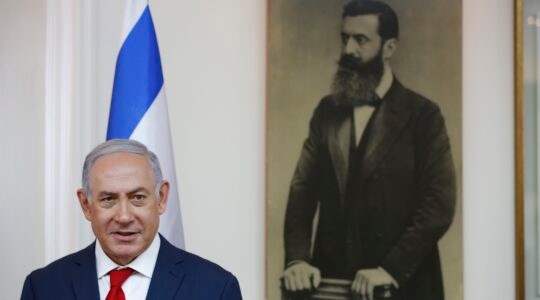TEL AVIV (JTA) — With an interim agreement on Iran’s nuclear program in place, President Obama and Israeli Prime Minister Benjamin Netanyahu each face formidable challenges ahead.
For Obama, the goal will be to move from the interim agreement to a broader and more permanent deal within six months, all while managing deep skepticism about the deal from some U.S. lawmakers who want to pass new sanctions legislation against Iran.
For his part, Netanyahu must convince Obama to hold out for a final accord that corrects what the Israeli leader called the “historic mistake” of the deal signed late Saturday night.
The two leaders talked by phone on Sunday, and Obama reportedly agreed to keep Netanyahu up to date on the progress of negotiations. On Monday, Netanyahu said he was dispatching his national security adviser, Yossi Cohen, to Washington to consult on the parameters of a permanent accord.
For nearly two decades, Netanyahu has been sounding the alarm about the dangers of Iran’s nuclear program, steadily raising the volume since he retook the bully pulpit of the prime minister’s office in 2009. He has brandished a cartoon bomb at the United Nations podium for illustration, criticized allies, and said time and again that Israel will “defend itself, by itself, against any threat.”
Experts have credited the prime minister with helping persuade the world to enact an unprecedented sanctions regime against Tehran. Netanyahu also has helped ensure that the United States keeps Israeli interests in mind; when discussing the Iran deal, U.S. Secretary of State John Kerry almost always mentions Israel’s security concerns.
Now that the United States has gone against Israel’s wishes and signed the deal, Netanyahu’s challenge is to keep up the pressure — now more than ever.
“It is true that the international pressure which we applied was partly successful and has led to a better result than what was originally planned, but this is still a bad deal,” Netanyahu told his parliament on Monday. “It reduces the pressure on Iran without receiving anything tangible in return, and the Iranians who laughed all the way to the bank are themselves saying that this deal has saved them.”
A year ago, with negotiations stalled, Iran’s then-president, Mahmoud Ahmadinejad, was questioning the Holocaust and speaking openly of wiping Israel off the map. Now the world is welcoming the conciliatory messages of his successor, Hasan Rouhani, and celebrating the first diplomatic agreement with Iran in a decade.
Analysts believe the agreement makes an Israeli strike on Iran less likely in the short term because attacking Iran during ongoing negotiations would anger the United States and could shatter the international alliance against Iran’s nuclear ambitions.
“It’s not very likely that any government will carry out any operation when there’s an agreement,” said Ephraim Kam, a senior research fellow at Tel Aviv University’s Institute for National Security Studies, reflecting a consensus among analysts. “The Israeli government can decide to surprise everybody, but logically it’s not the right time.”
Over the coming months, Netanyahu’s voice will be amplified by the pro-Israel lobby groups in Washington and voices in Congress that also are skeptical about the interim deal with Iran and the likelihood that it will lead to a final accord that will dismantle Iran’s bomb-making capabilities.
They will also be keeping an eye on whether Iran honors the interim deal. In 2003, Tehran continued uranium enrichment even during a supposed freeze. For years, North Korea used negotiations and interim agreements as stalling tactics while it built up its bomb-making capacities and became a nuclear power.
Netanyahu “needs to wait until the Iranians start cheating again,” said Ephraim Inbar, director of the Begin-Sadat Center for Strategic Studies at Bar-Ilan University. “They’ve done it before.”
JTA has documented Jewish history in real-time for over a century. Keep our journalism strong by joining us in supporting independent, award-winning reporting.






